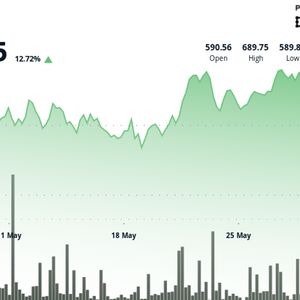As the cryptocurrency world navigates the complexities of blockchain and digital assets, a parallel revolution is underway in Artificial Intelligence. Just as robust frameworks are crucial for the crypto space, ensuring the safe and ethical development of AI is becoming paramount. A recent report co-led by AI pioneer Fei-Fei Li emphasizes this urgency, advocating for proactive AI safety laws to address not just current, but also potential future risks associated with advanced AI systems. Why Proactive AI Regulation is Essential Now? The report, from the Joint California Policy Working Group on Frontier AI Models, emerges from Governor Newsom’s initiative to thoroughly assess AI risks following his veto of SB 1047. This group, comprised of leading figures like Fei-Fei Li, Jennifer Chayes, and Mariano-Florentino Cuéllar, argues for a shift in perspective. Instead of solely reacting to present dangers, policymakers must anticipate and legislate for future AI risks that are not yet fully understood or manifested. Think of it like this: Current Risks are Real, But Limited Scope: Existing AI regulations often focus on issues we already see, like bias in algorithms or data privacy concerns. Future Risks are Exponential and Unknown: As AI evolves, especially frontier AI models , the potential for unforeseen and far-reaching consequences increases dramatically. Proactive Laws are Preventative Measures: Just as we don’t wait for a nuclear disaster to understand its devastation, we shouldn’t wait for extreme AI-related incidents to realize the need for strong safeguards. The report highlights that while concrete evidence for extreme AI threats like AI-driven cyberattacks or bioweapons is still “inconclusive,” the potential stakes are too high to ignore. This is where the concept of “trust but verify” comes into play. Demanding AI Transparency : The ‘Trust But Verify’ Approach A core recommendation of the report is to boost AI transparency . This isn’t about stifling innovation but fostering responsible development. The report suggests a two-pronged strategy: Empowering Internal Reporting: Create safe channels for AI developers and employees to report concerns about safety testing, data practices, and security measures within their organizations. Mandatory Third-Party Verification: Require AI companies to submit their safety claims and testing results for independent evaluation by external experts. This approach aims to create a system of checks and balances, ensuring that claims about AI safety are not just taken at face value. It’s about building trust through verifiable evidence and accountability. Key Recommendations at a Glance To summarize, the report advocates for several crucial policy changes: Recommendation Benefit Why it Matters Mandatory Public Reporting of Safety Tests Increased accountability and public scrutiny Ensures AI developers are prioritizing safety Transparency in Data Acquisition Practices Identifies potential biases and ethical concerns Promotes fairness and responsible data handling Enhanced Security Measures Disclosure Reduces vulnerabilities to misuse and attacks Protects against malicious applications of AI Third-Party Evaluations of Safety Metrics Provides objective validation of safety claims Builds trust in AI safety protocols Expanded Whistleblower Protections Encourages internal reporting of safety violations Creates a culture of safety within AI companies Industry Reaction and the Path Forward Interestingly, the report has garnered positive responses from across the AI policy spectrum. From staunch AI safety advocates like Yoshua Bengio to those who opposed stricter regulations like SB 1047, there seems to be a consensus on the need for a more transparent and proactive approach. Even critics of SB 1047, like Dean Ball, see this report as a “promising step” for California’s AI safety framework. Senator Scott Wiener, who championed SB 1047, also views the report as a positive development, aligning with the ongoing legislative conversations around AI governance. The report’s recommendations echo elements of both SB 1047 and its successor, SB 53, particularly the requirement for developers to report safety test results. This report could be a significant win for the AI safety movement, which has faced headwinds recently. By emphasizing proactive measures and broad industry consensus, it provides a strong foundation for shaping future AI regulation and ensuring the responsible evolution of this transformative technology. To learn more about the latest advancements and discussions surrounding AI regulation and frontier AI models , explore our articles on key developments shaping the future of AI policy and safety.


















